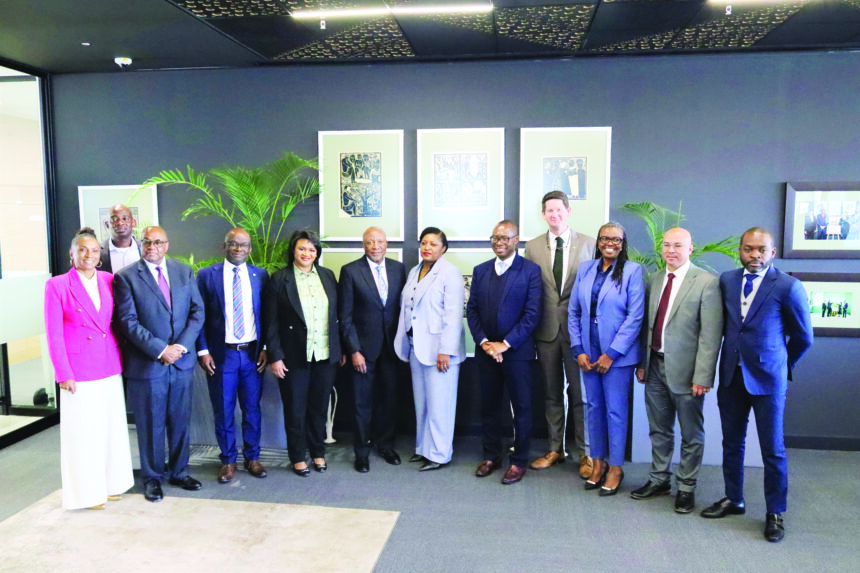President Nangolo Mbumba on Friday urged the banking sector to consider the financial hardships Namibians are going through, and cut interest rates.
Meeting the country’s banking leadership, he reminded them that the public is bleeding and suffering due to high bank charges and unsustainable interest rates.
The President met the bankers at Nedbank Namibia’s headquarters to exchange notes, and to determine the status of the banking sector. In his remarks, Mbumba told the bankers that Namibians are not happy with high interest rates, excessive bank charges, and sometimes services which leave much to be desired.
“It is not an exaggeration that without a well-functioning banking sector, the economy would grind to a halt,” he said.
He urged local banks to also play a more proactive role in terms of development, particularly when it comes to funding small and medium enterprises (SMEs) through products which can substantially lessen collateral requirements and involve more equity instruments.
“Government would like to see banks become development partners, whose sole motive should not be an exclusive focus on profit, but also social inclusion and mainstreaming of the unbanked segments of our society through innovative banking instruments such as mobile banking,” the President added.
At the time of going to press, the Bankers Association of Namibia CEO Brian Katjaerua had not responded on the President’s appeal.
The banking sector also chose not to comment when asked why they insist on hiking the interest rates on bonds when the Bank of Namibia increases the repo rate, while BoN governor Johannes !Gawaxab reasoned that they don’t have to.
The monthly bond on a N$1.2 million house has increased by an average of
N$2 590 since 2021. The domestic home loan interest rate in 2021 was 8.5%, compared to the current 11.75%.
The repo rate is defined as the lending rate offered by a central bank to commercial banks for its short-term funding requirements. Commercial banks then pass on the interest rate levied by the central bank to consumers through interest charged on loans.
Nedbank Namibia managing director Martha Murorua welcomed the President and his delegation, saying Namibia is at a pivotal moment where the synergy between government leadership and industry expertise can unlock unparalleled opportunities.
“By working together, we can create a robust financial ecosystem that not only meets the needs of our people, but also propels Namibia onto the global stage as a beacon of economic excellence,” she noted.
Last year, member of parliament Veikko Nekundi called on the National Assembly to urgently amend the Bank of Namibia (BoN) Act to enable the central bank to protect the most vulnerable segment of Namibian society.
In the same vein, a local law firm last year approached the central bank to compel commercial banks to provide more relief for heavily-indebted Namibians, particularly as banks continue to repossess homes to the financial detriment of ordinary citizens who default on payment.
Motivating his motion, Nekundi said bank charges are another scheme by commercial banks to swindle people of their hard-earned money.
“These bank charges are not only high; they are unjustifiable and unreasonable. These schemes are designed to rob our people and derail them economically,” the parliamentarian charged.
That motion seeks to amend central bank legislation to include powers to regulate commercial banks, and give BoN the right to oversee all bank charges.
Nekundi submitted that skyrocketing interest rates, coupled with consistently rising inflation, are bleeding ordinary citizens dry, a situation he said is worsening and making it more difficult for ordinary people to put bread on the table.
Some of the charges that he railed against include those for electronic fund transfers (EFTs), cash and withdrawal charges, debit and credit card swiping, online transactions, as well as account management fees.
Current bank charges
Commercial banks are on the rate hike bandwagon, with First National Bank (FNB) Namibia’s Gold Lifestyle account’s monthly account fee going up to N$51 for pay-as-you-use services. Cash withdrawals at FNB ATMs increased from N$13.70 per N$500 to N$14.35 per N$500. The Gold Lifestyle account is for FNB customers who earn between N$7 000 to N$25 000 per month, or N$84 000 to N$299 999 per annum.
Meanwhile, eWallet fees have increased to N$12 for sending N$20-N$500, N$15 for N$501-N$2 000, N$30 for N$2 001-N$4 000, and N$40 for sending N$4 001-N$5 000.
These figures were contained in FNB Namibia’s 2024/25 pricing guide. The increases, effective from this month, will force customers to make vital decisions between fuel, food, water or sanitation, or using banking services.
Nedbank
On transactional fees and charges, Nedbank Namibia charges for cash withdrawals for the 2024/25 period as customers pay N$2.90 per N$100 at the bank’s ATM. A Nedbank customer pays N$5.60 + N$13.70 per N$500 (max N$35) for cash withdrawals at other banks’ ATMs.
The bank charges customers N$11.99 for sending 0-N$500, N$23.00 for N$501-N$1 000, N$31 for sending N$1001- N$1 500, N$36 for N$1 501-N$4 000, and N$37 for sending N$4 001-N$5 000. The Nedbank 2024/25 fees are effective from 4 March 2024 to 2 March 2025.
Standard Bank Namibia
For the 2024 year, this bank charges N$12 for sending a Blue Voucher of up to N$500; N$24 for N$500-N$1 000; N$30 for sending N$1 000-N$2 000; N$34.50 for N$2 000-N$4 000, and N$42 for N$4 000-N$5 000.
Bank Windhoek
Bank Windhoek customers pay N$12.19 per N$300 withdrawals at its ATMs, with a minimum of N$12.19 and maximum of N$60.
For withdrawing at another bank’s ATM, a Bank Windhoek customer pays N$5.60, in addition to N$13.70 per N$500, with a maximum of N$35. Furthermore, EasyWallet charges are N$13 for sending amounts of up to N$500.00, N$23.90 for N$501-N$1 000, N$35.84for N$1 001-N$1 500 and N$39 for sending N$1 501-N$4 000. Reversal of a transaction costs a client N$32.29. -mndjavera@nepc.com.na
Caption: Intervention needed… President Nangolo Mbumba and other government officials met commercial banks’ leadership on Friday to discuss pertinent issues pertaining to the sector.
Photo: Contributed


